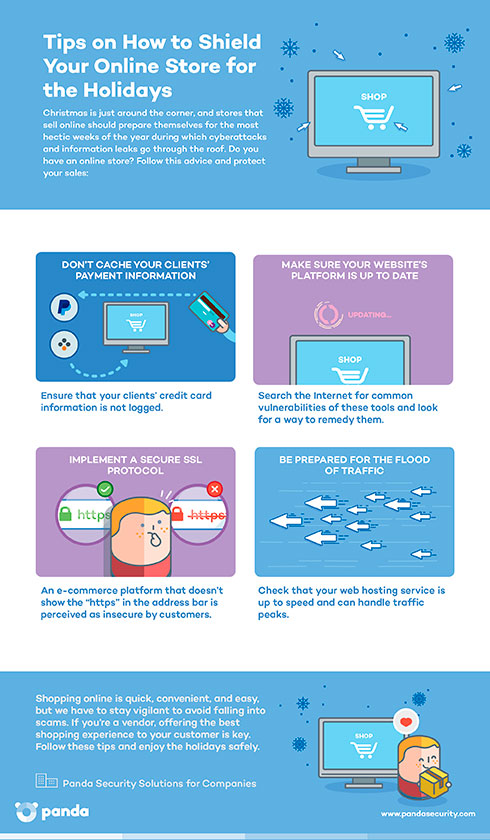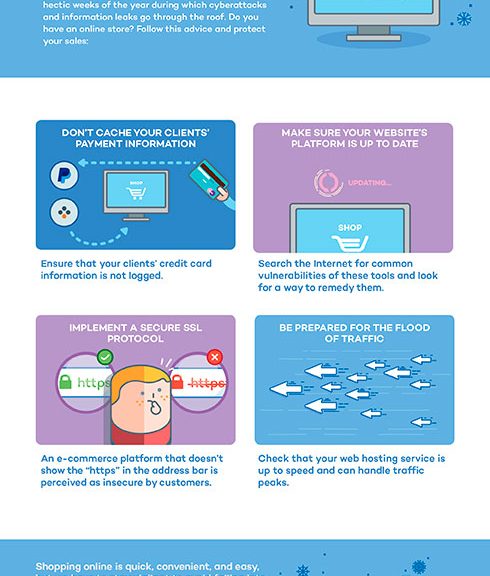
The gift giving season is just around the corner. With the frenzy of Black Friday and Cyber Monday already behind us, shops that conduct their sales online (and their clients) should be prepared for the most hectic weeks of the year still to come.
Unfortunately, this is also the busiest time of year for scammers that try their luck at fishing in frenzied waters. Cybercriminals are well aware of how many companies, regrettably, don’t invest enough in protecting their online sales platforms. Thus, cyberattacks and data breaches soar around the holidays. Luckily, if you run an e-commerce website, you’re still in time to follow these tips:
 Don’t cache your clients’ payment information. The best way to avoid problems is by thoroughly verifying that credit card numbers are never stored in your data base and never pass through your servers. It’s as easy as resorting to one of the many payment solutions on the market, such as PayPal or Braintree, which take it upon themselves to handle that sensitive data for you.
Don’t cache your clients’ payment information. The best way to avoid problems is by thoroughly verifying that credit card numbers are never stored in your data base and never pass through your servers. It’s as easy as resorting to one of the many payment solutions on the market, such as PayPal or Braintree, which take it upon themselves to handle that sensitive data for you.- Make sure your website’s platform (Prestashop, Magento…) is up to date. Search the Internet for common vulnerabilities these tools may have and look for a way to remedy them. The same goes for plugins and extensions you may have installed.
- Implement a secure SSL protocol. This is essential to your online store (especially when transmitting user information). In truth, it’s essential to any website, but customers perceive e-commerce platforms that don’t show the “http” in the address bar as insecure. And with good reason.
- Be prepared for the flood of traffic. A large number of users will connect at the same time to make holiday purchases on your website. Check that your web hosting service is up to speed and can handle traffic peaks, that you are using a well-configured load balancing solution and a CDN to reduce the traffic that your server has to withstand. Not only will you avoid downtime, but also you will increase speeds and improve user experience.
From a vendor’s standpoint, these are some issues to be kept in mind to increase security for the holidays.
But there’s something else that businesses should keep in mind when it comes to protection at this time of year. Namely, that their employees, whether they like it or not, will be making purchases using company computers.
Among the precautionary measures that we would like to impart, these are especially pertinent. Before making a purchase, your employees should make sure:
- That their system is up to date has the protection of a reliable advanced cybersecurity solution.
- That they only make purchases on well-known websites that have a solid reputation, and that the webpage uses an SSL protocol with security certificates.
- That they avoid bargains that seem implausible, especially if they appear in emails and the sender is not fully trustworthy.
With this advice and a bit of common sense, holiday preparations shouldn’t bring about any unpleasant surprises. Shopping online is quick, convenient, and easy, but we have to stay vigilant to avoid falling into scams.
The post How to Bolster Security for Your Online Store This Holiday Season appeared first on Panda Security Mediacenter.








 During Black Friday and the weeks leading up to Christmas, tech savvy shoppers visit brick-and-mortar stores to see the items they want to buy, but they use price comparison apps on their phones to check for the best deal. This is called “showrooming”. Shopping apps do things like scan barcodes for price comparisons between your local retailer and online stores, send alerts when the price drops, find money-saving coupons, and even tell which stores in the mall have a particular item on sale.
During Black Friday and the weeks leading up to Christmas, tech savvy shoppers visit brick-and-mortar stores to see the items they want to buy, but they use price comparison apps on their phones to check for the best deal. This is called “showrooming”. Shopping apps do things like scan barcodes for price comparisons between your local retailer and online stores, send alerts when the price drops, find money-saving coupons, and even tell which stores in the mall have a particular item on sale. 



